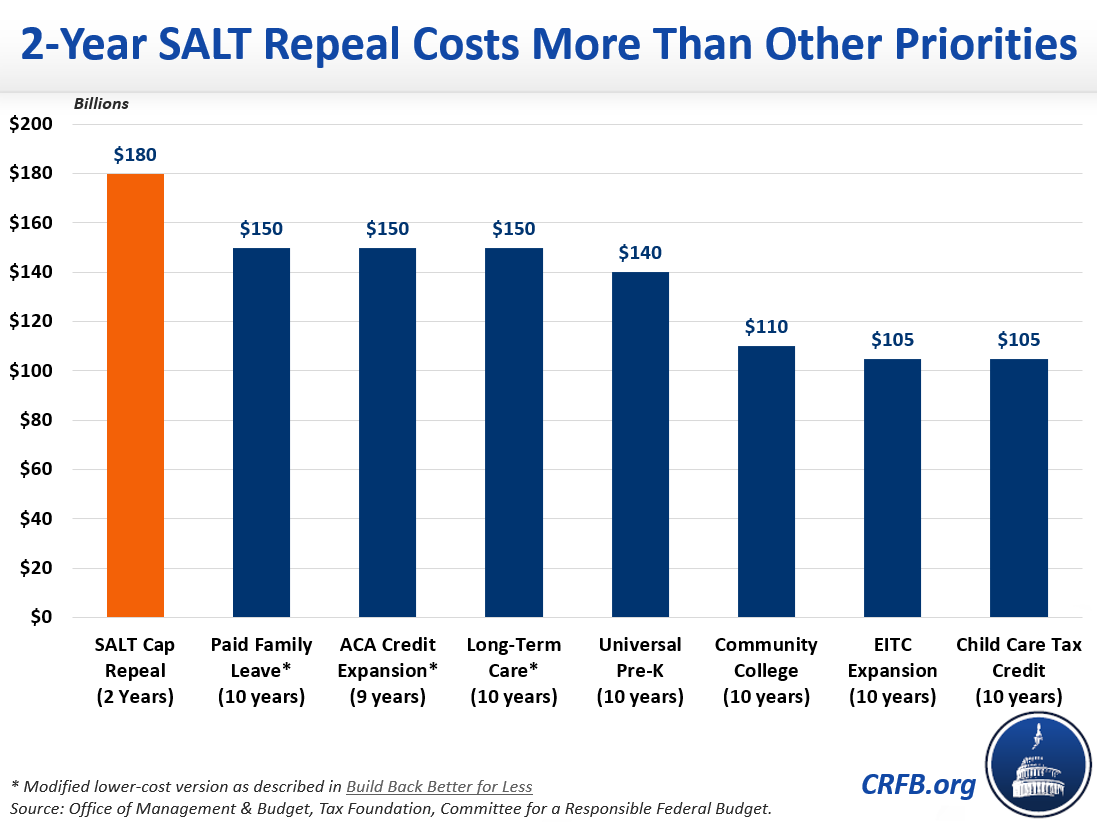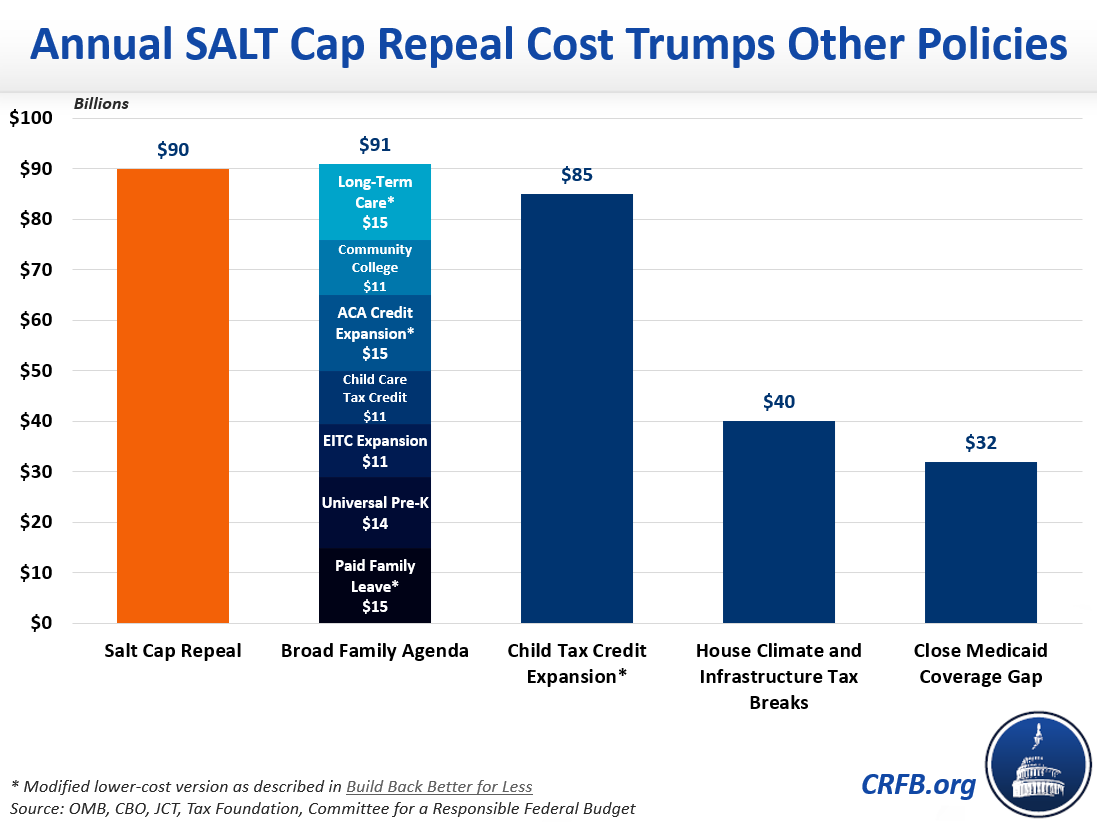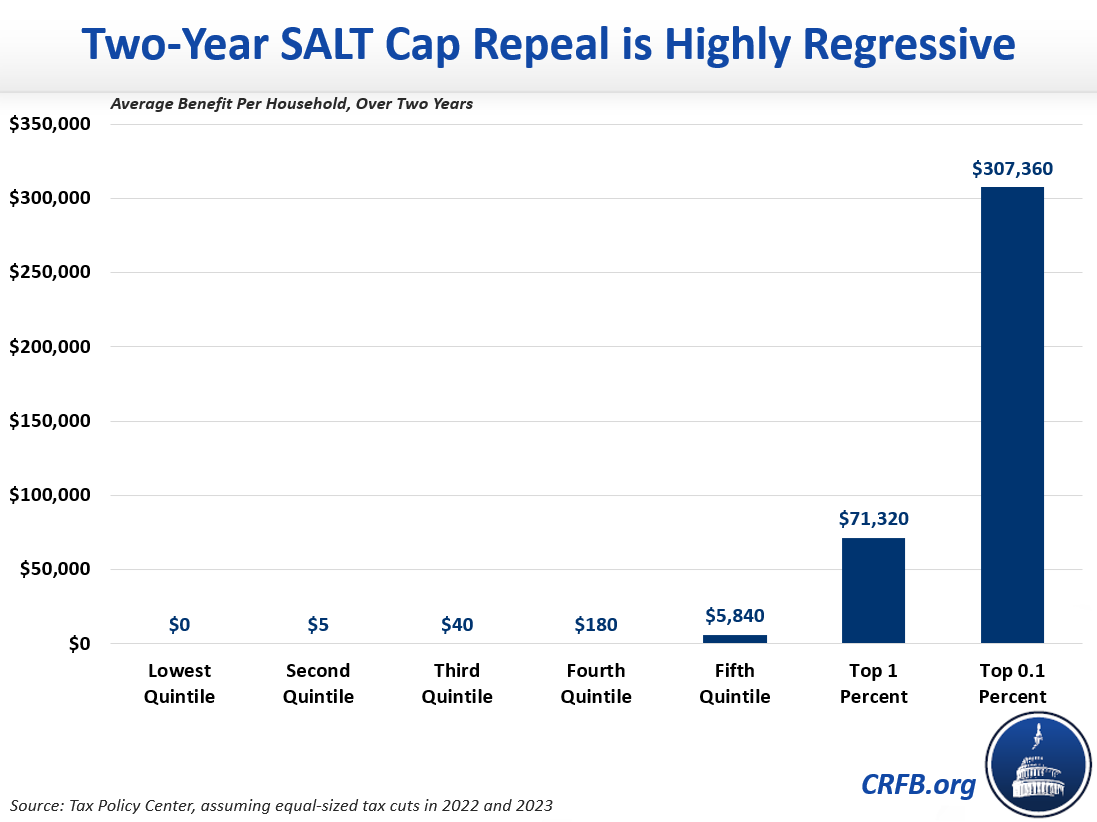SALT Cap Repeal Does Not Belong in Build Back Better
Press reports suggest lawmakers are considering adding a two-year repeal of the cap on the deduction for state and local taxes (SALT) to their Build Back Better reconciliation plan. As we’ve explained before, SALT cap repeal is highly regressive and would weaken tax simplicity, neutrality, and fairness. At an estimated cost of roughly $180 billion over two years and $90 billion annually, SALT cap repeal would cost more than most other priorities under discussion. Repealing the SALT cap permanently could cost another $200 billion to $900 billion over a decade.
SALT Cap Repeal Would be Costly
Based on a recent estimate, a two-year SALT cap repeal would cost roughly $180 billion1 – consuming around one-tenth of the $1.5 trillion to $2.0 trillion package under consideration.
For the cost of a two-year SALT cap repeal, policymakers could enact the President’s proposals to provide universal pre-K, expand the Earned Income Tax Credit (EITC) or the Child and Dependent Care Tax Credit (CDCTC), or provide free community college. One hundred eighty billion dollars is also enough money to offer robust but modified versions of paid family leave, expanded home- and community-based services (HCBS or long-term care) funding, and more generous Affordable Care Act (ACA) premium subsidies.

On an annual basis, the $90 billion cost of SALT cap repeal would be enough to fund all seven of these initiatives – pre-K, EITC, CDCTC, ACA subsidies, paid leave, community college, and long-term care. Alternatively, it would be enough to fund a means-tested and reformed version of the expanded Child Tax Credit – meaning each year of SALT cap repeal potentially costs a year of CTC benefits. The annual cost of SALT cap repeal is more than twice as large as the cost of all climate- and infrastructure-related tax credits proposed in the House and nearly three times as large as the cost of closing the Medicaid coverage gap to provide health insurance to Americans in poverty.

SALT Cap Repeal Would Be Highly Regressive
Unlike most of these other initiatives, SALT cap repeal would almost exclusively benefit higher earners. As we’ve shown before, 90 percent of the benefit of SALT cap repeal would go to the top 10 percent of earners. As a result, repealing the SALT cap is far more regressive than the 2017 Tax Cuts and Jobs Act (TCJA). Over two years, SALT cap repeal would distribute over $300,000 to a household in the top 0.1 percent of earners compared to only $40 for a family in the middle of the income spectrum.
With the SALT cap repealed and current tax rates retained, in fact, the reconciliation package might actually offer a net tax cut for most high-income households. (We’ll write more on this soon as more details on the tax package become clear.)

Temporary Repeal Would Set Stage for Costly Permanent Tax Cuts
A two-year SALT cap repeal would also create pressure for future extensions. As Committee president Maya MacGuineas recently explained, holding the repeal to two years wouldn’t “actually shrink the package...just shorten it.”
Extending SALT cap repeal until the TCJA expires at the end of 2025 would cost an additional $200 billion. If the TCJA is ultimately extended, the cost of extending the SALT cap repeal would be roughly $900 billion through 2031.
Potential Costs of SALT Cap Repeal Policies
| Policy | Total Cost | Cost of Extension |
|---|---|---|
| Two-Year SALT Cap Repeal | $180 billion | n/a |
| Four-Year Repeal, Until TCJA Expiration | $380 billion | $200 billion |
| Ten-Year Repeal, Assuming TCJA Extension | ~$1.1 trillion | ~$900 billion |
If lawmakers also include a one-year CTC and three-year ACA expansion as rumored in the process and a six-year child care policy as in the House bill, this would mean $1.5 trillion to $3.5 trillion of potential extensions. A package with $2 trillion of direct costs would thus set the stage for $3.5 trillion to $5.5 trillion of total gross costs, after extensions.
Policymakers should abandon use of these expiration gimmicks. And they should avoid using scarce resources for SALT cap repeal, which would be a costly mistake.
Read more options and analyses on our Reconciliation Resources page and our SALT Deduction Resources page.
1 Note we previously estimated SALT cap repeal would cost $85 billion per year based on older Joint Committee on Taxation and Tax Policy Center estimates. However, recent improvements in the economic outlook and in expected price levels have led us to switch to the more recent Tax Foundation estimates.


